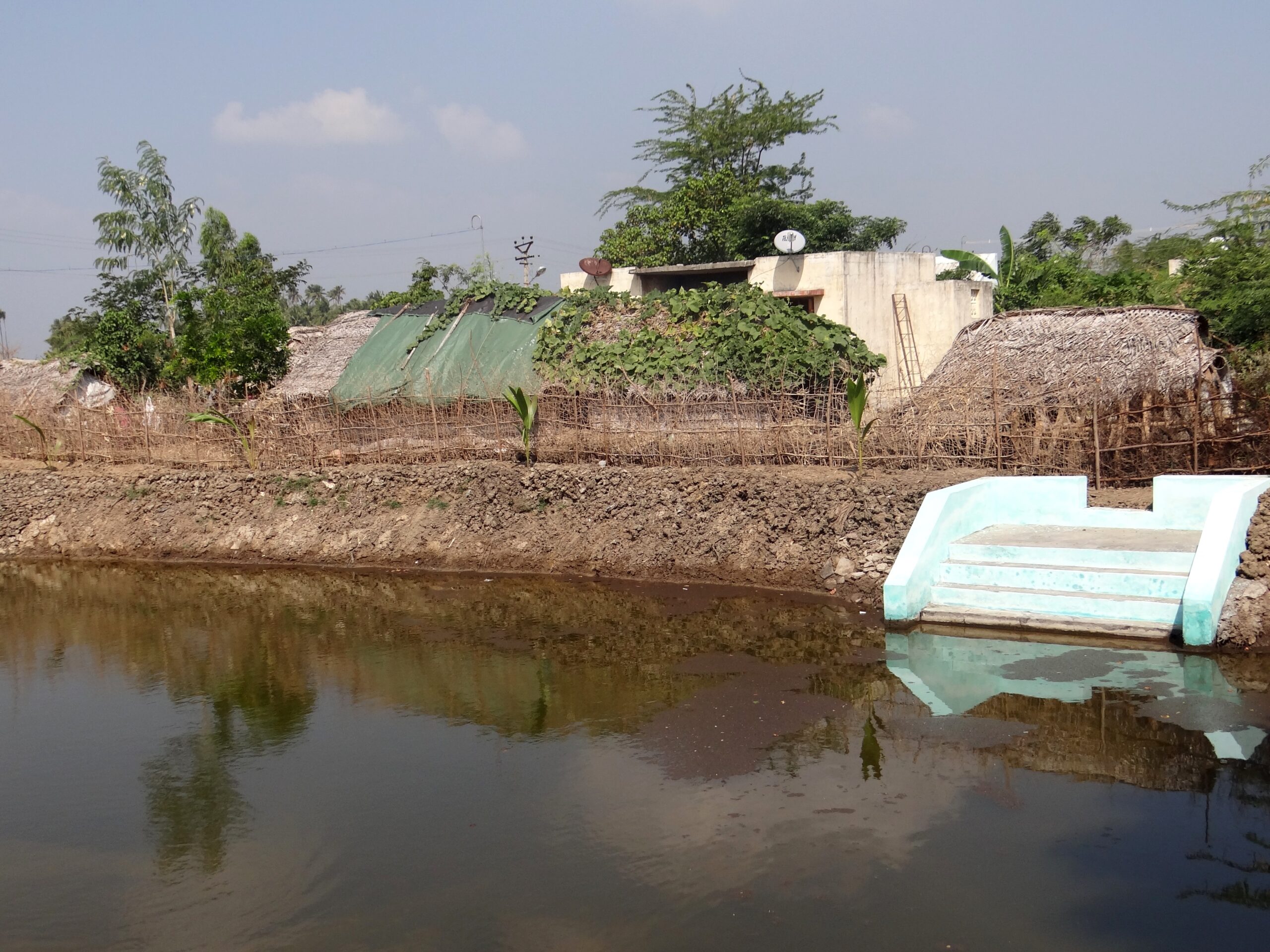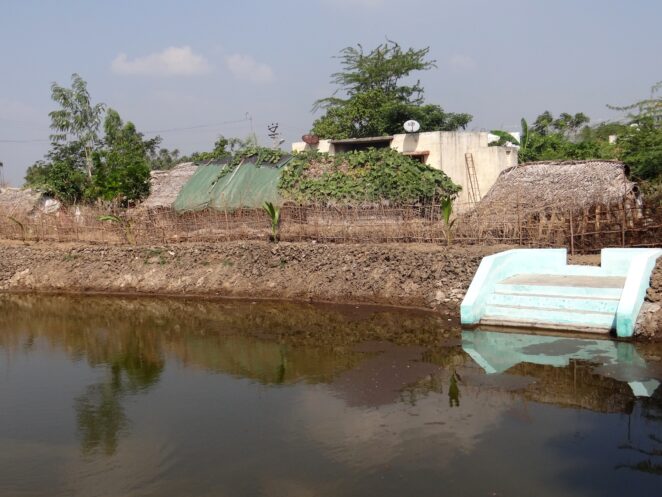Rain water harvesting through a bund-protected pond – A new water source for drinking and irrigation in Chinnakaramedu, India


The people in the village of Chinnakaramedu have been facing water stress which is predicted to become worse, aggravated by climate change. Salt water intrusions have been affecting the groundwater, backwaters and fields around the village. This has been endangering the agricultural sector in the area, on which nearly all of the 160 families rely on for a living. Most of the village’s fields could not be cultivated. On the few fields that were still cultivable, only salt-resistant, sandy-soil crops could be planted. Drinking water was also scarce as the water from the only two hand pumps supplying drinking water for the community was saline from February through June. While the villagers did receive piped water, the frequency and quantity of water piped was very inconsistent and unreliable as the village is at the end of the piped water line.
To address the water scarcity and salinity the community – supported by the EU-sponsored project “AdaptCap” – constructed a freshwater pond to harvest rain water. The pond itself acts as a surface water reservoir, helps to recharge groundwater and reduce the salinity levels. Capturing rainwater and linking the new pond with fresh water drainage and flowing canals surrounding the fields extended the growing season for the community. The six hand pumps located in and around the pond now give out fresh, non-saline water for domestic purposes, while the piping system again delivers drinking water. The rainwater harvested can also be pumped to the overhead tank for further sand filtration. The newly constructed rainwater harvesting pond has improved the community’s access to water immensely. It is used for irrigation, domestic purposes and acts as a water recharging unit, increasing the level of ground water. The women do not have to walk long distances to fetch water anymore as they can now get water in the village. Rainwater harvesting has resulted in:
- Additional capacity for rainwater storage: 6,504 m3
- Increase of agricultural command area: 72 acres previously left uncultivated can now again be used for cultivation
Implementation costs
The overall costs of this adaptation measure – including a local vulnerability and needs assessment, capacity building measures in the community, technical support as well as material and labour costs – amounted to Rs. 707,549. Of these, Rs. 682,549 were borne by AdaptCap while the community contributed Rs. 25,000.
Operation & maintenance of the system
In order to remain operative in the long run, several parts of the system require regular operation and maintenance (O&M). Regular O&M activities include:
- Verifying all components of the system are fully intact
- Cleaning of irrigation channels
- Cultivating the bund planting
- Strengthening and repairing the bund and fencing
The community has distributed the responsibilities and timeframes for O&M activities among their members, with the families taking care of the vegetation cover while the Village Development Committee ensures the overall functioning and strengthening of the bund and fencing. The Panchayat is responsible for cleaning the channels.The average monthly O&M costs amount to Rs. 2,000. The local Task Force Committee collects a monthly contribution fee from all the beneficiaries in the village.
M&E of activities and benefits
A monitoring and evaluation (M&E) system was developed to regularly screen and assess the adaptation project’s sustainability and impact. Information is collected in four areas:
- Effectively achieved vulnerability reduction
- Acceptance by and technical feasibility for the community
- Cost for implementation and regular O&M
- Positive and negative side effects (i.e., environmental, social, economic)
Challenges and lessons learnt
- Ensure a strong buy-in and efficient and sustainable implementation through community participation during all phases of such an initiative.
- Before executing any adaptation measure for which land is needed, the relevant land documents need to be obtained.
- A ‘no objection’ certificate should be obtained from the concerned departments before executing such an adaptation measure.
- A frequent transfer of government officials at the district level caused some delays in the implementation of the project, as it was difficult to get the necessary approvals. Such potential delays should be considered in the time planning.
Project background and partners
The project “AdaptCap – Strengthening Adaptation Capacities and Minimizing Risks of Vulnerable Coastal Communities in India” financed by the European Commission has set out to strengthen the adaptation capacities of vulnerable coastal communities in Andhra Pradesh and Tamil Nadu (India) and minimize their climate change-related risks using an integrated approach.
The three-year initiative is implemented by the Indo-German Environment Partnership Programme of Deutsche Gesellschaft für Internationale Zusammenarbeit (GIZ-IGEP) in partnership with four Indian and international partners.
GIZ-IGEP is responsible for the overall implementation and project management.
AVVAI Village Welfare Society (AVVAI)supports the stakeholders in three cities and nine villages in Tamil Nadu as a local partner, providing training and implementation support in assessing adaptation needs and developing and carrying out adaptation measures.
Academy of Gandhian Studies (AGS) fulfills the same role in Andhra Pradesh.
adelphicontributed to developing technology solutions for the pilot projects and M&E frameworks, designing and implementing capacity building programmes and providing technical support for pilot project implementation.
ICLEI South Asia led the implementation of activities in the six urban areas targeted by AdaptCap.
(0) Comments
There is no content